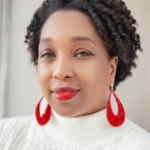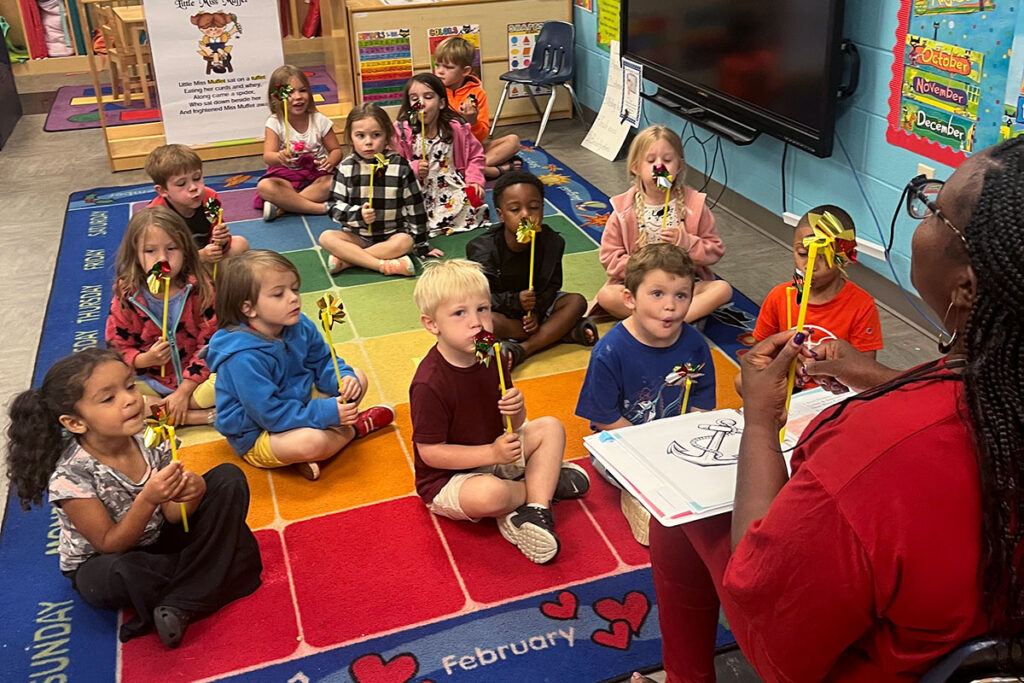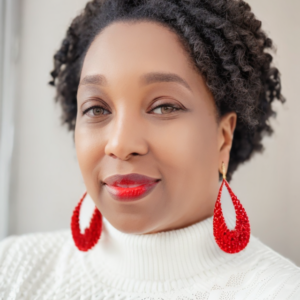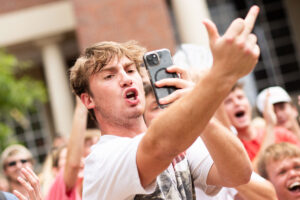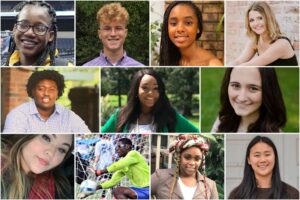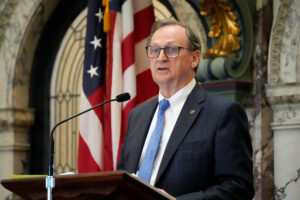A TikTok slide-show depicts Dantanio Brooks-Threadgill standing in a chair pouring rice into a bowl in the kitchen sink. He adds oil to a skillet before adding chicken. The 4-year-old then pours canned tomatoes, beans and corn into three separate blue bowls on the counter before cutting the top off of and coring a bell pepper. He washes those in the sink and fills them with meat, rice, vegetables and beans. The final slide shows a finished stuffed bell pepper meal.
Kenya Wolff received the video from a parent whose child made a meal using one of the family meal kits from The Growing Healthy Minds, Bodies and Communities program, a standards-based curriculum out of the University of Mississippi that focuses on “the whole child.” The whole-child approach to education focuses on all areas of a child’s development including social-emotional learning, cognitive skills and literacy. UM’s program also has a keen focus on yoga and nutrition.
Early childhood professor Kenya Wolff and Assistant Chair of Teacher Education Alicia Stapp first piloted the program at Willie Price Lab School in Oxford in 2019. She and Stapp completed a research study that showed introducing preschool children to yoga and mindfulness had positive effects. Under Wolff’s tenure as interim director, the lab implemented Conscious Discipline and yoga. The pair then began creating the curriculum for GHMBC and secured funding from the Kellogg Foundation to begin expanding the program.
“We started with just a 12-week program,” Wolff said. “Then during COVID, we had a great pilot. We did it in surrounding schools here in Lafayette and Oxford, but we really wanted to see it grow into schools that were less well funded, and Kellogg saw our vision.”
However, COVID hindered some of the plans Wolff and Stapp had. To compensate for family events, they began to send meal kits home. The kits were so popular that they are now a staple of the program. Twice a year, recipe kits that include a book, meal ingredients, and a video of a chef preparing the meal are sent home to families.
“We started that during COVID, and it was so popular,” Wolff said. “We had them sign up if they wanted it. In Sunflower County, every child went home with a meal kit. All the parents signed up.”
GHMBC now serves 22 Pre-K classrooms and approximately 400 students in Sunflower County, Greenwood/Leflore, Amory and several schools served by the Delta Health Alliance in Vicksburg, Greenwood, Ruleville, and Indianola. The curriculum includes the Mississippi State Pre-K standards along with the social-emotional learning lessons. Teachers are provided with the guides, all materials and videos for the yoga and mindfulness components. The program is not scripted, and teachers are encouraged to blend their own teaching styles into the lessons.
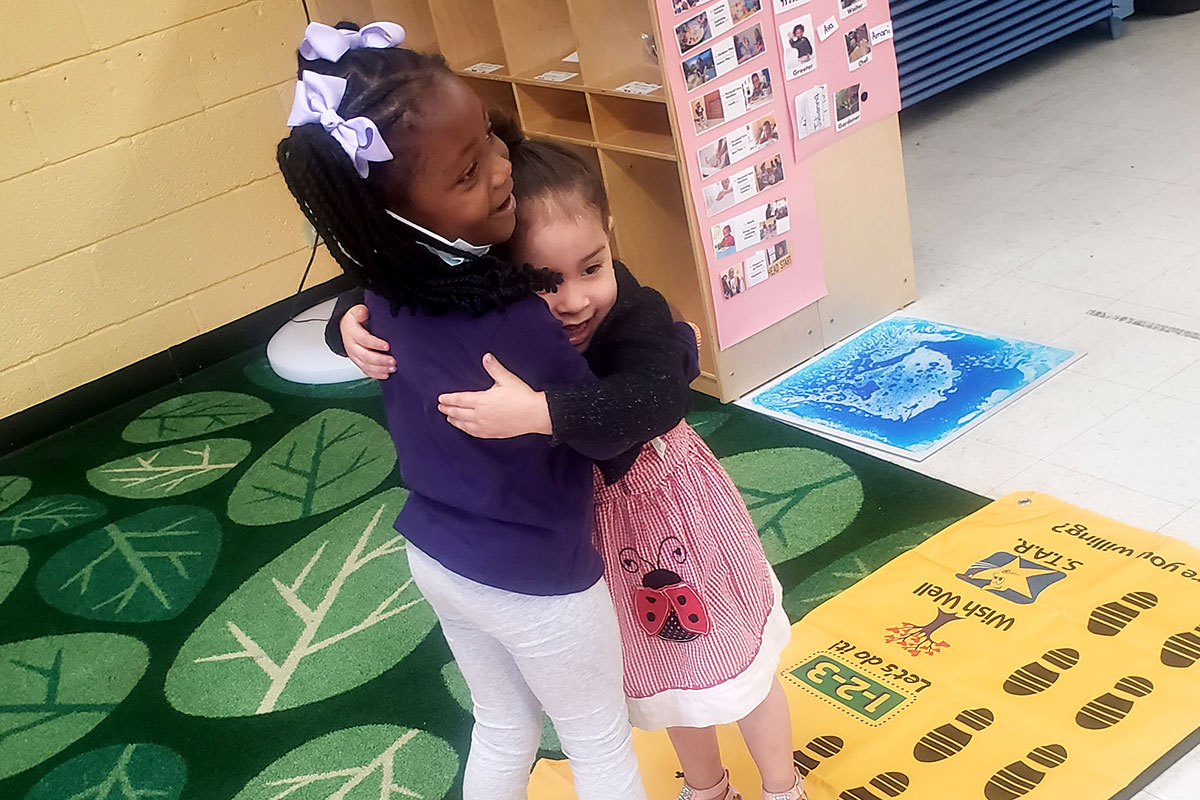
GHMBC trains teachers during an annual summer retreat for teachers from across north and central Mississippi. During the weekend, the participants learn to incorporate yoga—along with nature hikes, dancing, cooking and gardening—into their curriculum. Program Manager Amber Sims also provides hands-on help for teachers. She ensures teachers have all the necessary materials, proper replacement equipment and answers to questions. She also helps prepare and deliver program materials.
“I was a kindergarten teacher before starting this job,” Sims told the Mississippi Free Press. “So when most curriculums you get as a teacher, they send you a box with a teacher’s manual in them, and you get maybe an online platform, and that’s pretty much it. You have to dig into it yourself. Our curriculum is unique in all the teachers, and administrators have access to me as program manager.”
Nutrition is an important component of the program. The program provides classrooms with a tower garden to grow fruits, vegetables and herbs so that children may learn about gardening. Children harvest the food and use it in math and science lessons. They also learn about preparing healthy foods through classroom instruction. The program provides a crock pot, child-safe knives, cutting boards and ingredients.
“We knew that Mississippi has a history of segregation and inequities,” Wolff said. “We knew that there was high poverty rates and especially in rural areas. Even though there’s a rich history of personal farming, there were gaps in access to healthy foods and a lot of just desert food deserts.”
Anti-bullying and anti-bias activities are also a major part of the lessons that were designed with Mississippi students in mind.
“A lot of times people get scared when you’re talking to kids about race or you’re talking to kids about bias,” Wolff said. “No, we’re just talking about (that) it’s okay for everyone to be different. We all have so many similarities, but we’re also different. We need to praise and celebrate those differences.”
University of Mississippi Associate Professor of Psychology Stephanie Miller said that being able to form representations about the world is important when teaching young children to regulate their emotions.
“There’s been a lot of work recently that’s started to tie this idea of reflection and regulation to equity because a lot of the way we treat other people and we think about our interactions with other people is based on a lot of these habits and sometimes biases as well,” Miller told the Mississippi Free Press. “So encouraging children to stop, reflect, take a beat and think about how the other people are feeling—other people’s perspectives and other things they’re bringing to the situations—might be related to prosocial behavior (and) anti-bias behavior.”
To learn more, visit growinghealthymbc.wixsite.com/ghmbc.

